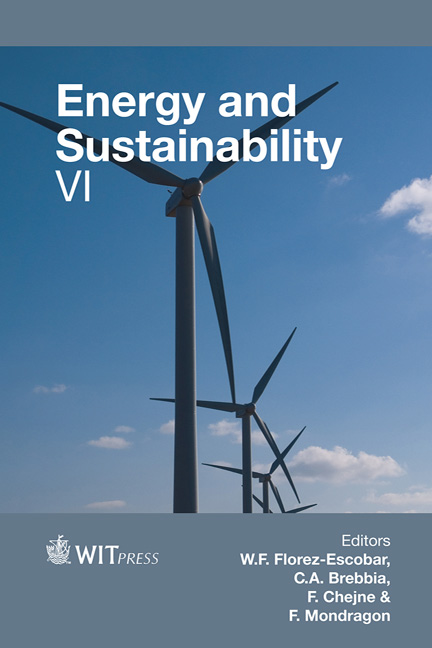Conversion Of Bagasse To Char-water Fuel By Pyrolysis
Price
Free (open access)
Transaction
Volume
195
Pages
11
Page Range
39 - 49
Published
2015
Size
407 kb
Paper DOI
10.2495/ESUS150041
Copyright
WIT Press
Author(s)
G. J. Griffin, L. C. K. Tan, L. K. Ho, M. Pannirselvam
Abstract
The purpose of this research was to study the conditions that maximize the formation of char when sugar cane bagasse (SCB) is pyrolysed. It has been proposed that char produced from biomass may be crushed and then suspended in water to produce a char-water fuel suitable as a heavy oil replacement. Experiments were conducted by thermal gravimetric analysis (TGA) and Fourier transfer infrared spectrometry (FTIR) to measure the effect of the chemical additives diammonium phosphate (DAP) or monoammonium phosphate (MAP) on the mass-loss processes of SCB when heated between 100°C and 700°C under nitrogen. The additives were impregnated on the SCB as aqueous solutions at concentrations of between 0.01M and 1.0M. For untreated bagasse, char yield was 18wt% at 400°C and 16.5wt% at 700°C. For treated SCB, it was observed that the additives initiated mass loss at lower temperatures and produced significantly larger yields of char than untreated bagasse. When heated to 450°C, the char yield increased with additive concentration. If heated above 450°C, another mass loss occurred between 450°C and 600°C, but only for those SCB samples treated with additives at concentrations greater than 0.1M. Thus, when heated to 700°C the maximum yield of char occurred for SCB sample treated with 0.1M additives. Analyses of the evolved pyrolysis gases using FTIR showed that treated SCB, at concentrations greater than 0.1M DAP or MAP, contained less hydrocarbon species and were enriched in water consistent with the catalytic degradation of the SCB. When treated with higher concentrations of additives, gases that evolved at temperatures above 450°C were rich in phosphoric acid esters and aromatic and unsaturated phosphonic acid species.
Keywords
pyrolysis, bagasse, bio-char, catalyst, TGA, FTIR





